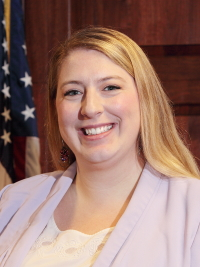
Marissa Gillett, Chair of Connecticut’s Public Utility Regulatory Authority
When Eversource argues before PURA, the Public Utilities Regulatory Authority, for an increase in electricity rates, the cost of that proceeding (to hire attorneys and experts) is paid by us, the ratepayers as a cost of doing business. Okay, fair enough. But then, if Eversource appeals the decision, ratepayers pay for another round of attorneys and experts. It’s another so-called a “recoverable expense.”
Here’s another hint about Eversource’s professed devotion to its customers. Eversource pays various lobbying and trade groups to represent the interests of Eversource shareholders and management in meetings with state agencies and the legislature. Very often, those interests are directly opposed to the interests of ratepayers, but ratepayers are forced to pay those expenses too.
PURA’s new Chairperson, Marissa Gillett, is shining a bright light on these practices. She is a true ratepayer advocate and she is bringing change to the way public utilities, ie.monopolies, are regulated in Connecticut. SB 966, An Act Concerning Procurement of Standard Service Electricity and the Regulation of Public Utilities, if passed, will put an end to a number of ways in which ratepayers have to pay expenses that benefit management and shareholders to the detriment of ratepayers. This is one of many bills that the Jonah Center has supported through written testimony in the current session of the Connecticut General Assembly. As you might guess, Eversource and Avangrid (the holding company of United Illuminating) have testified in opposition to SB 966.













